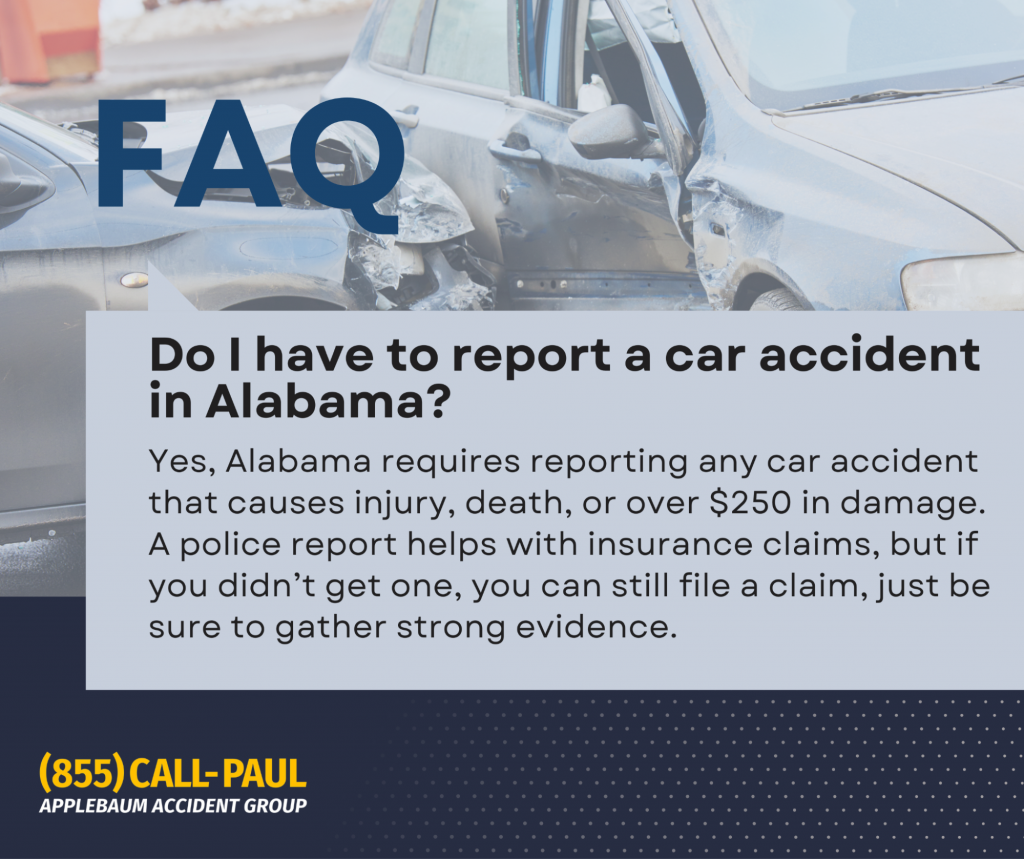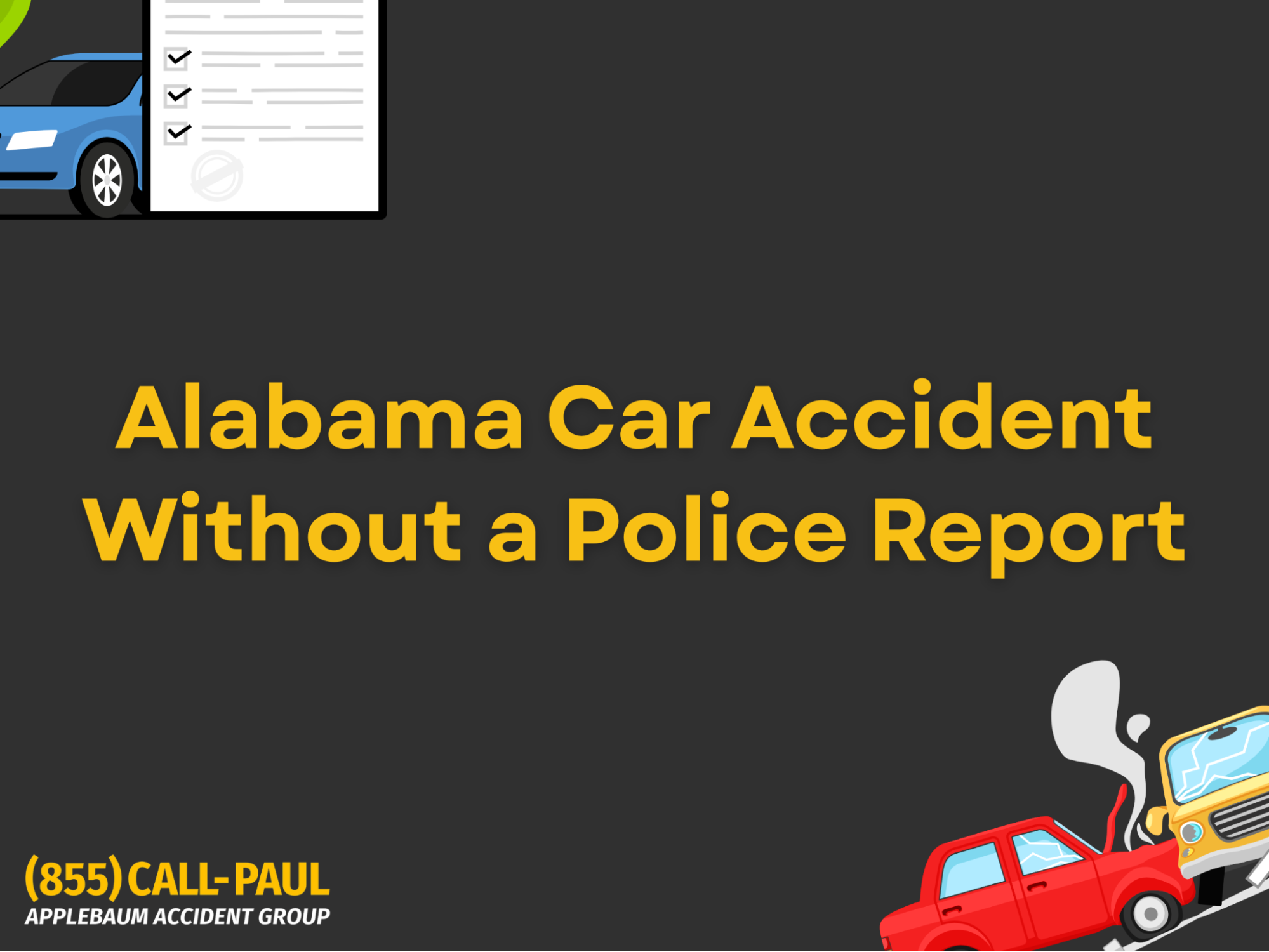Yes, Alabama requires reporting any car accident that causes injury, death, or over $250 in damage. A police report helps with insurance claims, but if you didn’t get one, you can still file a claim, just be sure to gather strong evidence.

This guide breaks down:
- When reporting is legally required
- What to do if you didn’t call police
- How to build a strong claim on your own
- And how to avoid getting blamed when it’s your word against theirs
Whether it was a fender-bender or a deer strike, the key is evidence, and fast action. That’s where Applebaum Accident Group comes in. We connect you with attorneys who know how to win even when the paperwork’s missing.
If you’re just looking for quick answers, scroll ahead. But if you want the full playbook on protecting yourself after a no-report crash, let’s dive in.
Do You Have to Report a Car Accident in Alabama?
Yes, in many cases. Alabama law requires you to report any accident involving injury, death, or property damage exceeding $250. That’s a lower threshold than most people expect, just a dented bumper or cracked headlight can easily meet it. Under Alabama Code §32-10-5, you must file a crash report (Form SR-13) with the Department of Public Safety within 30 days.
In cases where the other driver is uninsured and damage exceeds $500, you’re also required to file Form SR-31 with Alabama Law Enforcement. Failing to report a qualifying accident can lead to legal penalties, including fines, license suspension, or worse, especially if someone was hurt and the state isn’t notified.
What qualifies as “property damage” often confuses drivers. The law counts repair costs, not just visible damage. A scratched bumper that hides a bent frame could quietly cross that $250 line. When in doubt, report.
Can You File an Insurance Claim Without a Police Report?
Yes, but it’s more difficult, and risky. Insurance companies rely on official documentation to evaluate claims. Without a police report, you’re already on shaky ground. If your crash wasn’t reported at the scene, your success now depends on how well you document everything afterward.
To strengthen your claim, you’ll need:
- Photos of the vehicles, damage, street conditions, and license plates
- Witness information, ideally with contact details and a written statement
- Medical records documenting your injuries
- Repair estimates or invoices to show the cost of property damage
A powerful move? File a delayed crash report (Form SR-13). Even though it’s not from the scene, it still creates a state record that supports your version of events. And make sure to notify your insurer immediately, some require notice within 24–72 hours after the crash.
What Happens If You Don’t File a Report?
Three major risks follow:
- Your insurance company may deny your claim, especially if they find out the accident met the reporting threshold
- You could face legal consequences, including license suspension
- You may lose the ability to prove fault if the other driver tells a different story
Here’s a scenario we see often: someone skips filing a report, and two weeks later the other driver reports the accident, but blames them. Now it’s their word against yours. And if they also claim injury? That could affect your own legal exposure and potential settlement.
Without a report, you’re vulnerable. That’s why evidence matters more than ever. The stronger your documentation, the better chance you have of defending your case and securing compensation.
What to Do After an Accident Without a Police Report
If you didn’t file a report at the scene, follow these steps immediately:
- Take comprehensive photos
- Vehicle damage (all angles)
- Road signs, intersections, skid marks
- Both license plates
- Weather conditions and traffic signals
- Exchange contact and insurance info
- Get names, phone numbers, insurance providers, and driver’s licenses
- Collect witness details
- Write down names and numbers of anyone who saw the accident
- Seek medical care quickly
- Even minor injuries can become major issues later, and delay weakens your claim
- File Form SR-13 if required
- Submit to the Alabama Department of Public Safety within 30 days if the crash involved injury, death, or $250+ in property damage
Delaying these steps increases your exposure to blame, denial, or legal headaches. Document thoroughly and act quickly.
Hit a Deer in Alabama and Didn’t Call the Police?
If your car hit a deer in Alabama and you didn’t call the police, don’t worry, it’s not a criminal offense. Animal-related accidents are treated differently than collisions involving other drivers. However, you still have responsibilities.
If the damage to your vehicle exceeds $250, Alabama’s reporting laws kick in. That means you’ll likely need to file a crash report (Form SR-13), especially if you’re planning to file an insurance claim. Most insurers require some form of official documentation to approve vehicle repairs under comprehensive coverage.
You’re not liable for a wildlife accident unless a third party was somehow involved (e.g., another vehicle swerving to avoid your car). Still, document the crash as if it involved another driver, take photos, note your location, and get a repair estimate to back your claim.
Is Alabama a No-Fault State for Car Accidents?
No. Alabama follows a fault-based system, which means the driver who caused the accident is financially responsible for any resulting injuries or property damage.
Here’s the challenge: proving fault without a police report is much harder. Insurance companies, judges, and attorneys all rely on police documentation to determine who was at fault. Without it, your claim could devolve into a “he said, she said” battle, one that insurers love to deny.
That’s why gathering strong evidence on your own becomes critical if no report exists. It’s also a big reason why contacting a lawyer might be your next best move.
Should You Call a Lawyer If There’s No Police Report?
Absolutely, especially if:
- Someone was injured
- The other driver disputes fault
- Your insurer denies your claim or drags their feet
A lawyer can level the playing field. They can help you:
- Submit a retroactive crash report (SR-13 or SR-31)
- Secure dashcam, body cam, or surveillance footage
- Navigate tricky insurance communications
More importantly, a qualified attorney understands how to build a compelling case even without a police report. Many of the attorneys in our network have worked with clients in similar situations and know how to prove what really happened, when the paperwork isn’t in your favor.
Need Help? Applebaum Accident Group Has Your Back

When there’s no police report, every detail matters, and every misstep can cost you. At Applebaum Accident Group, we’ve built our service around helping people who feel stuck or uncertain after a car accident.
Here’s how we help:
- We connect you with attorneys who know how to win even without a police report. These are experienced professionals who can gather evidence, build a timeline, and prove your case when others might dismiss it.
- We make medical and legal help accessible, even if you don’t have documentation. Our network includes medical providers who understand soft-tissue injuries and attorneys who fight for real people, not paperwork.
- We step in quickly. You don’t have time to waste, and we don’t waste time. Most of our clients get matched with a lawyer within hours.
If you’re feeling overwhelmed, unsure who to trust, or worried the system will ignore your voice, don’t go it alone. Contact Applebaum Accident Group, and we’ll connect you with professionals who take you seriously and fight like it’s personal. Because for us, it is.





